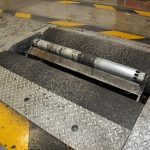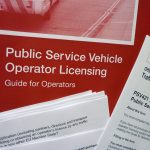Skills and training, coach parking, low-carbon fuels, and a clear pathway to zero-emission vehicle driveline evolution are among calls made to government by RHA ahead of the Spring Statement on 6 March.
The trade body has prepared a prospectus of its requests that highlights some of the issues being dealt with by its members in the coach and road freight sectors.
Policy priorities from RHA are built around “stability, long-term growth, and targeted support to tackle the major challenges that the road transport industry currently faces to ease cost pressures on operators,” says Managing Director Richard Smith.
In a wide-reaching submission, RHA has asked Chancellor Jeremy Hunt to continue the freeze on fuel duty and maintain the temporary 5p cut that is scheduled to end on 23 March. It also wants Mr Hunt to incentivise the take-up of renewable fuels such as HVO via an emissions-based rebate.
In noting that the same level of fuel duty applies to fossil diesel as to renewable alternatives, RHA is critical of the government’s treatment of low carbon fuels and the road to net-zero as “two separate, distinct policy areas.” Instead, it believes that they must be viewed holistically, and that the role of HVO and others “should be recognised.”
For the move to zero-emission, RHA wants a realistic timetable for the necessary change in vehicle technologies, and support for SME businesses as they plan for it. A decarbonisation roadmap for commercial vehicles is necessary, as is accelerated investment in associated infrastructure, the Association continues.

Clean Air Zones must be reviewed for effectiveness, and a commitment should be made to remove them once air quality levels are met. In addition, RHA wants scrutiny of any Zero Emission Zone proposals, with a prevention of local authorities introducing those “before the vehicle market can deliver.”
For coach parking, RHA calls for changes to planning policy to make obtaining the necessary approval easier. It also wants full expensing – which allows companies to claim 100% capital allowance on qualifying plant and machinery investments – to capture vehicle leasing costs.
On recruitment, the trade body has underlined its existing call for expansion of the skills bootcamp approach to category D driving licences, and its quest for reform of the Apprenticeship Levy into a Skills Levy that includes funding for approved vocational courses.
To that, RHA adds how “entry level” heavy vehicle technical training needs to be added to the skills bootcamp structure. Funding for apprenticeships in heavy vehicle mechanical training should be increased to address the falling number of educational institutions that offer such courses, it continues.
Read the RHA submission in full here.



























